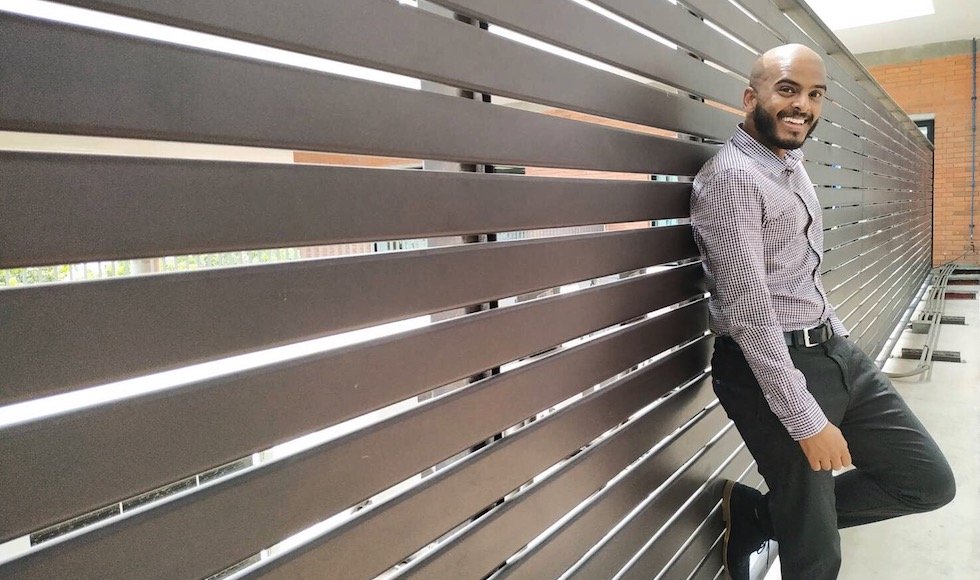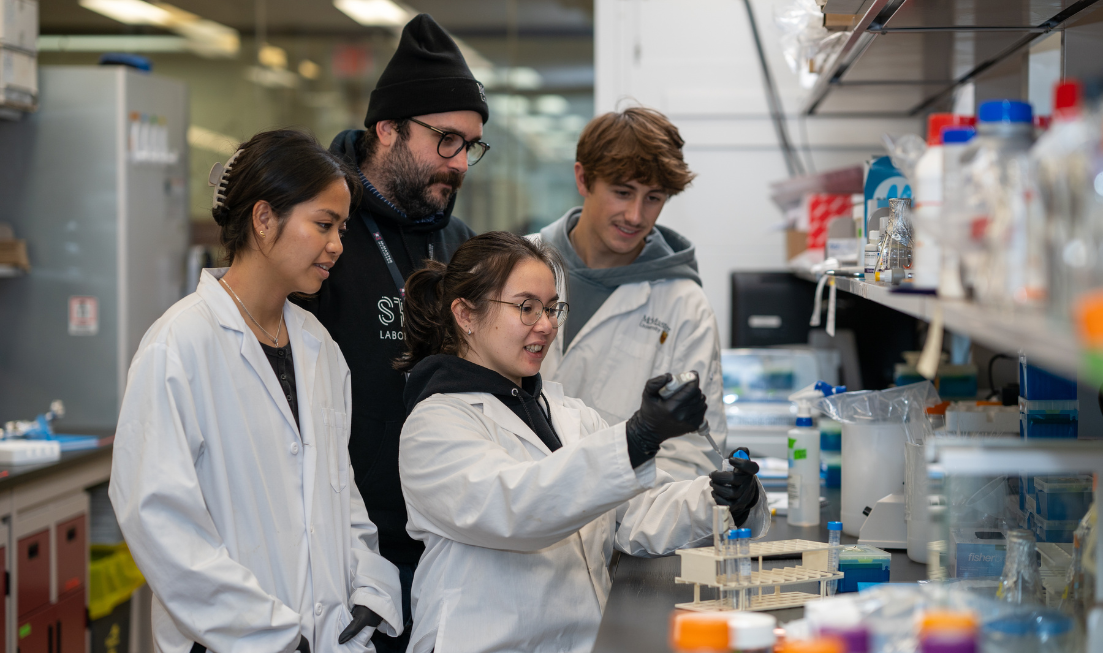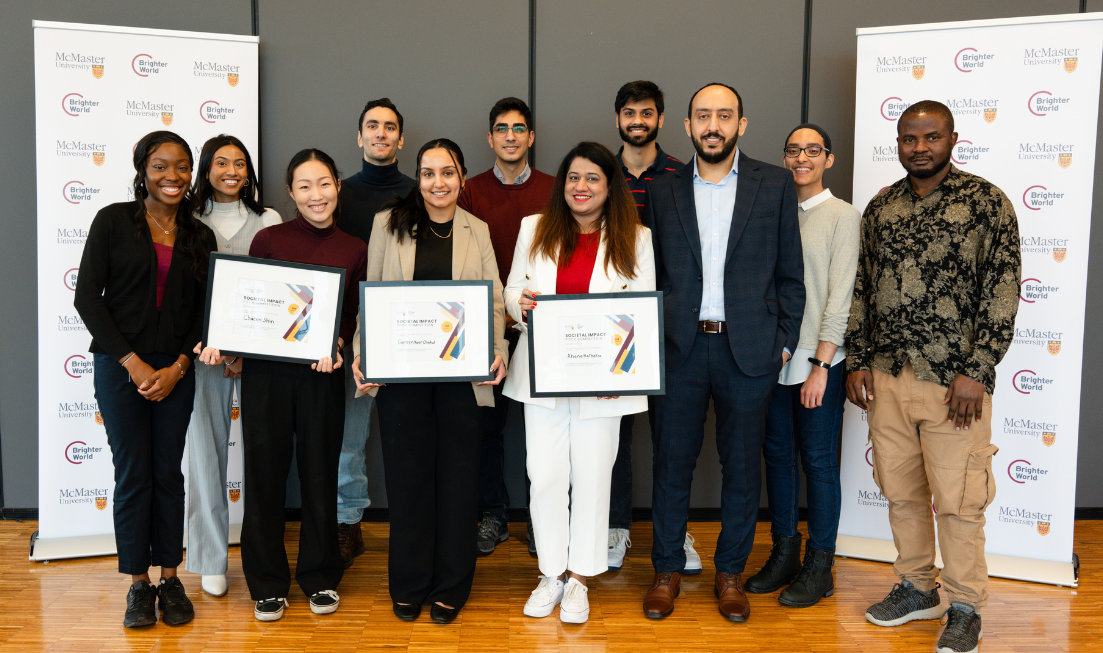Alumni Insights: An interview with Leshawn Benedict by MSc GH student Natasha Ross

McMaster’s MSc. Global Health program is known to present many pathways. As a recent graduate currently working for Bruyère Research Institute while simultaneously creating a successful podcast, Public Health Insight, Leshawn Benedict shows just that. Leshawn graduated from the program in 2020 amidst the COVID-19 pandemic and shares his unique outlook as a new graduate in the global health field.
Leshawn completed his honours Bachelor of Science at the University of Toronto, double majoring in biology and biochemistry. As his focus shifted from the “genetic underpinnings to more social aspects and consequences of health outcomes”, Leshawn pursued and completed a Master of Public Health program at Western University and identified that in the program he learned about “systemic barriers that are present in health care, the judicial system, and our education system that prevent individuals from having optimal health”. Following a practicum placement experience in Thailand, Leshawn’s interest in global health grew, leading him to make the decision to attend McMaster University to complete the MSc. in Global Health . In this interview, Leshawn shares his thoughts on his experiences and takeaways from his time in the program.
How do you feel your education in the MSc. Global Health program at McMaster University prepared you for your current professional role?
The MSc. in Global Health program helped me be prepared to engage with any sort of global health workplace whether it be working in diverse teams, working virtually, developing cross-cultural intuition and just being able to understand the different concepts and challenges facing global health. It is interesting because right now everything has gone virtual for the most part at Bruyère, so a lot of what I did for my practicum and a lot of the skills that I learned to harness , are actually being implemented right now in my current position as a coordinator for community of practice. My current position entails working with individuals from all across the globe and considering different timelines, cultural barriers, language barriers and just considering the different nuances that comes on with working in a global environment.
Can you describe your field practicum for me a little bit? How did you get there?
It was a very interesting situation especially given the context of when I was trying to secure my placement. Due to COVID-19 a lot of the practicum placements that were initially secured were disrupted and so many of the students had to look for different practicums elsewhere. I was able to secure a practicum at Bruyère’s Research Institute working under the supervision of Dr. Allison Krentel who is amazing — and as you already know the end of that story, I was able to get rehired within the organization.
At Bruyère, I worked as a part of an interdisciplinary team and international research team. My role was to document and analyze the implementation research process that was undertaken for a project in Uganda and Cote D’Ivoire. I analyzed research articles, technical reports, and field data that was collected as part of this research project. The data looked at the experiences and motivations of something called community drug distributors working within lymphatic filariasis and elimination control programs. Community drug distributors is basically a term that’s interchangeable with volunteers within the community, especially in the context of sub-Saharan Africa. Community drug distributors are really the ones delivering the different medications for Neglected Tropical Diseases to the community as a trusted source, so it’s really important to understand what motivates them and what acts as barriers and motivators for them to be able to continue to do their job because if they are not able to give out and distribute medications to their community then we’ll see uptick in NTDs and that’s not good either.
What implementation research really is, which was new to me at the time, is a systematic approach that really analyzes, understands and addresses implementation bottlenecks and identifies optimal approaches for implementing health initiatives and strategies. Often times we forget that sure, we’re in the lab, we’re doing research, we come up with some sort of idea and intervention and you want to know how that would work and be implemented in the community. However, what you find is when you go into a community there’s so many different contextual factors that we have to consider that may hinder or facilitate the uptake of this implementation or intervention. The very nature of implementation research is demand driven so we are working with the community to understand what the community actually needs rather than imposing our own perspectives on what they should do. Essentially, you’re working with the community, developing research questions that are focused around the needs of the community and those implementing different initiatives within the community and you’re really taking into consideration that local context, which is fundamentally important, in my opinion, especially when we’re talking about global health.
What was the most rewarding part of the MSc. experience for you?
The most rewarding part of this experience I would say would be just really learning about implementation research. I wasn’t really familiar with the nuances of it before, but was able to really delve into this implementation research project that I lead. I was able to work with the individuals who are on the cutting edge, who actually created the documentation for implementation research, Dr. Allison Krentel, my supervisor and the individuals at the World Health Organization. I was communicating with them regularly and learning about implementation research and how to consider these different aspects into the final project that I was writing up. Being able to work with those professionals who are really working on the cutting edge of implementation research and learning from the source itself and then reading the book that they published is kind of surreal to me. Being able to get that involved at such an early stage of my career has been very rewarding.
To learn more about Leshawn’s experience in the MSc. Global Health program you can read the full interview here.
Global Health News, Student and Alumni ProfilesRelated News
News Listing

Daily News ➚
McMaster earns top spot for graduate student research intensity in annual rankings
Global Health News
December 9, 2024

December 4, 2024

